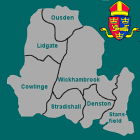  |
 |
 |
 |
 |
| Sat 24 Jan 2026 |

Church News Volume 7, Issue 10 (November 2006)Dear friends, "Blessed are the pure in heart, for they will see God." (Matthew 5:8) Morning assembly was under way, and the Head teacher introduced the Vicar, making his monthly visit. With Halloween approaching, the Head teacher knew he would want to stress that this meant the Eve of All Hallows, All Saints. As usual, the Vicar began his talk with a question. "Now then, who can tell me anything about All Saints?" A little girl in the front row wriggled excitedly, hand waving aloft. Oh dear, thought the Head teacher. Molly had been absent yesterday, when hed primed the youngsters with suitable facts, and cleared up any misapprehension about the pop group of the same name. The Vicar swooped gratefully on Molly. "Well now," he said. "What can you tell me about All Saints?" "I really like them!" Molly enthused. "Especially the stripy ones." Silence. Head teacher and Vicar exchanged glances, but Molly continued, "Granny always buys me a box when she comes to stay." "She means All sorts, not All Saints!" a boy shouted, and the children squealed with laughter. Before the Head teacher could intervene, the Vicar smiled and said, "Well done, Molly! All Saints is about All Sorts of people. I couldnt have put it better myself." In the Gospel, Jesus reminds us that there are all sorts of saints. We are so familiar with the Beatitudes that we sometimes forget the radical nature of this teaching, right at the beginning of the Sermon on the Mount. This list of people who are blessed includes some the world would not consider blessed at all, and not just those who mourn. We are often told, for example, that the poor in spirit are those who know their own spiritual poverty and their dependence on God. Yet the first Beatitude Matthew records could also be translated "Blessed in spirit are the poor," as in Lukes version, where "the poor", not "the poor in spirit", are blessed. Luke also mentions the downright hungry, rather than those who hunger for righteousness. Put the poor and hungry alongside those who mourn, and call them blessed, and you fly in the face of Jewish teaching at the time, which regarded such misfortune as a sign of Gods disfavour, a punishment for sin. Furthermore, the list makes no reference to keeping commandments or performing religious duties, which the Jewish authorities would have seen as vital for God's blessing. Its focus is on attitudes, a disposition of the heart towards God and our neighbour. Throughout Matthews Gospel, Jesus stresses the importance of the heart, the inner response as opposed to the outward show of religion. The radical element of all this was that anyone, Jew or Gentile, rich or poor, whose heart was in the right place, with God, could know themselves blessed by him. Jesus gathered around him as followers not highranking religious officials, but fishermen, a loathed tax collector even women! Here, at the beginning of his teaching about discipleship, he encourages them and us. Despite sadness, misfortune, persecution, all who love God and model their lives on his mercy and peace, all whose hearts are thus being purified, will see God at work in their lives and know themselves to be his children. An emphatic present tense in the middle of all those future tenses: theirs is the kingdom of heaven. Literally, the kingdom of heaven is of these, consists of these. Now. Who do we commemorate, on All Saints Day itself (November 1st)? We remember all those official saints recognised by the Church: remarkable Christians (from all sorts of backgrounds) who have left their mark in this world and serve as examples for disciples today. We remember the whole company of heaven, that great multitude (from all sorts of backgrounds) who stand before Gods throne and worship him. But we also remember that all Christians are saints-in-training, and all human beings potential saints. It's difficult enough to think of ourselves as saints, let alone see a halo around people outside the Church! Jesus shocked the religious authorities of his day by opening heaven to outsiders. What can we do to reach out to those who find church services boring or irrelevant? Isn't it time to reclaim this period around Halloween as a celebration of, and for, all God's children? What about an All Saints party next year, an excuse for fancy dress saints and holy applebobbing?
For the whole community. Revd Ian M. Finn |

